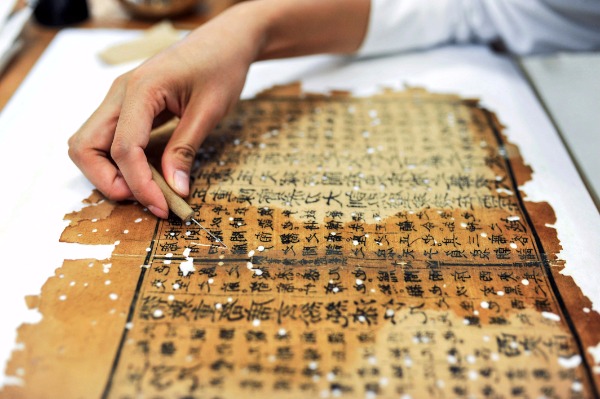Reading into the future
 0 Comment(s)
0 Comment(s) Print
Print E-mail China Daily, June 8, 2018
E-mail China Daily, June 8, 2018

For example, during the Qing Dynasty (1644-1911), when Siku Quanshu (The Complete Library of Four Sections), one of the largest collections of encyclopedic books in Chinese history, was complied following an imperial edict, six duplicates were also made.
Each one of the seven sets of books were housed in seven different libraries across China. Some were destroyed as a result of later wars. But three-and-a-half collections survive to this day.
Sun reveals that, as long as there is a second copy of the same book in the library, the duplicate will be moved into the new repository.
However, the most precious documents, which are often the only remnants of their type, will remain in Beijing.
The repository is also planned to become a hub for the digitization of the library's resources, which is a way to double down on the security and safety of the documents. Up to 16,000 terabytes of data will be housed there.
While the NLC has a branch library in Beijing near Beihai Park, Sun pointed out this backup is in the same city and some of its facilities are out-of-date.
"The site for a strategic repository should be at least 70 kilometers away and cannot be in the same seismic zone," he explains.
The new site in Chengde, which is about 200 km away and at a higher altitude than Beijing, offers a perfect location.
"Additionally, it's not that far away from Beijing, which is also convenient for our work," Sun adds.
Some technology that is used in the aerospace sector will be implemented at the repository to control humidity and temperature, but the deputy director also adds that different levels of protection will be designed for the different types of literary treasure.
"It's unnecessary to use the top technology to preserve all of the books," he says. "Sometimes, it can do more harm than good, making the books too fragile and sensitive to face any change in their environment."
Special systems will prevent possible damage by fire and flood.
The repository is only designed as a safe, rather than a library for the public, but Sun did not rule out the possibility for the facility to receive visitors in the future.
As the project proceeds, Sun says extra copies of contemporary books will also be housed there, as more space has been reserved for expanding the repository over the ensuing decades.
Calculations by the library predict that the repository will house over 25 million books and 1.18 million discs of digital replicas within the next three decades.
"We collect today to leave history for tomorrow," Sun says. "The project is not for our generation, but for our future."






Go to Forum >>0 Comment(s)